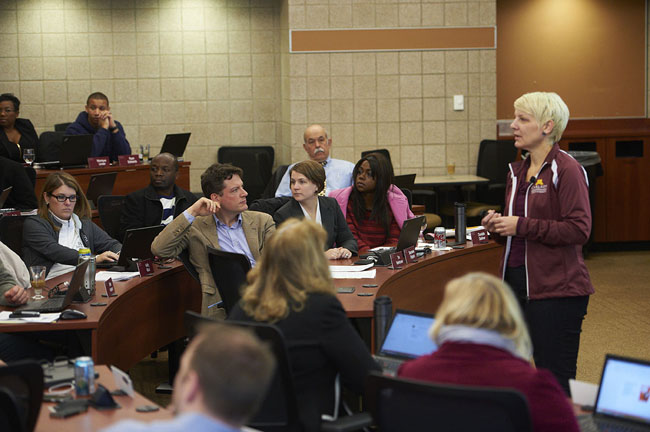Robyn Wick knows the Executive MBA program at Minnesota’s Carlson School of Management like Michael Jordan knows clutch buckets. She has worked her way up through the ranks after beginning her career in 1999 as program assistant for the EMBA program at Carlson. Now she runs the program. She has seen the changes in the EMBA market as a whole and the specific changes at Carlson.
She has held nearly every position imaginable in an administrative office for an EMBA program. Admissions manager? Check. Assistant director? Check. Associate director? Check. After directing admissions and recruiting from 2010 to 2012, Wick officially took reins of the program as the director in 2012.
Carlson boasts three EMBA programs. The main two-year program in Minneapolis, a joint program with Lingnan (University) College of Sun Yat-sen University based in Guangzhou, China, and a joint program with the Vienna University of Economics and Business held in Vienna, Austria. Considering that Carlson requires an international component from all business students—undergrads through executives—the robust international emphasis makes sense.
As with other EMBA programs, the state of the Carlson programs (especially the Minneapolis program) has largely been influenced by companies no longer sponsoring employees. Wick says although corporate sponsorship is good and can strengthen a program, students digging into their own pockets to cover the cost of an EMBA has led to a unique opportunity. Students paying for EMBAs are obviously more invested in but also intentional about the education the are receiving when compared to students who have traditionally relied on employers to pay their way. Carlson has adjusted, evolved, and improved with the changing and increasing demand for a top shelf education.
Wick is joined by Phil Miller, assistant dean of MBA programs at Carlson during this in-depth interview covering everything from the importance of leadership development in curriculum to why more than ever EMBA students are valuing building relationships with their professors and classmates.
Poets&Quants: What is Minnesota doing in the space that is new and different?
Robyn: There is a lot. For example, there will be brand new curriculum next year. Specifically, we have built up the leadership development and programming within the school and that curriculum. To help with that, we have brought on Kevin Wilde of General Mills.
Phil: Kevin has provided us with a grounded external view. He has been working with our faculty, specifically the HR program.
Robyn: He has been working with the students from the moment they step on campus and getting them to think in terms of large career goals. He is helping with a formal leadership course in the second year where the students work on studying leadership goals and career goals and then revisiting goals they made in the first year.
The new curriculum is shifting us towards a transitional program. After we met with different alums, we learned they love the tight cohort portion of the program. They like having classes with a close group of students and building those relations but they also want some electives and topical courses, adding them in a measured way. We are creating cohort electives. They will take classes within and outside of their cohorts.
Phil: The other cohort that starts later in the year will be in mixed classes. By the time the program is finished, students will meet students from three cohorts and not just their own like it used to be. Another thing that isn’t new but I think unique is our virtual team project. It is a year-long project, starting in October and finishing at graduation. We combine teams from Minneapolis with our Vienna and China campuses. They meet for a week and then finish the project virtually. Honestly, I think it is kind of a pain for them. Definitely it is a challenge. But it reflects the reality of the changing workforce. I am a big believer to the global element. We have a strong global emphasis. A requirement of our program is participating in a global residency.
Robyn: Our curriculum is based around the general manager program. The philosophies behind our curriculum stem from the fact that our students are coming in with a significant work experience. Our average age of students is 39. Many have already been in an upper management level. The first year of our curriculum includes the basics, then we build out from there.
Phil: With the leadership, we have also included an increase in career support. Students want career support and they don’t mean placement. It is not the same as full-time MBAs. They want leadership development and executive coaching. Our full credit lifecycle piece goes beyond the program and we continue to assist our students after graduation. Our program has been 80 to 90 percent of students wanting to be better leaders. We help answer the question of, how do we take functional leaders and turn them into general managers? How do we take a neurologist at the Mayo Clinic and prepare them to do process improvement for an organization worth over $9 billion? How do we prepare someone who grew up in a family business become someone who can confidently take over that business?
Robyn: Our classes are largely a microcosm of our community. We have leaders from big companies and then physicians and attorneys. We have nonprofit leaders and nurses.






Questions about this article? Email us or leave a comment below.